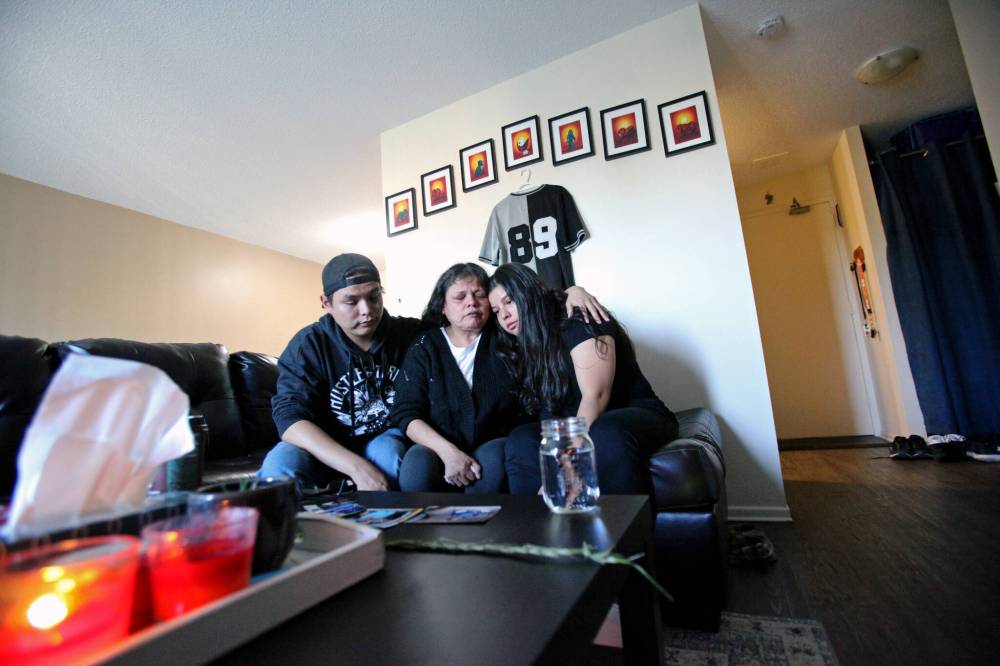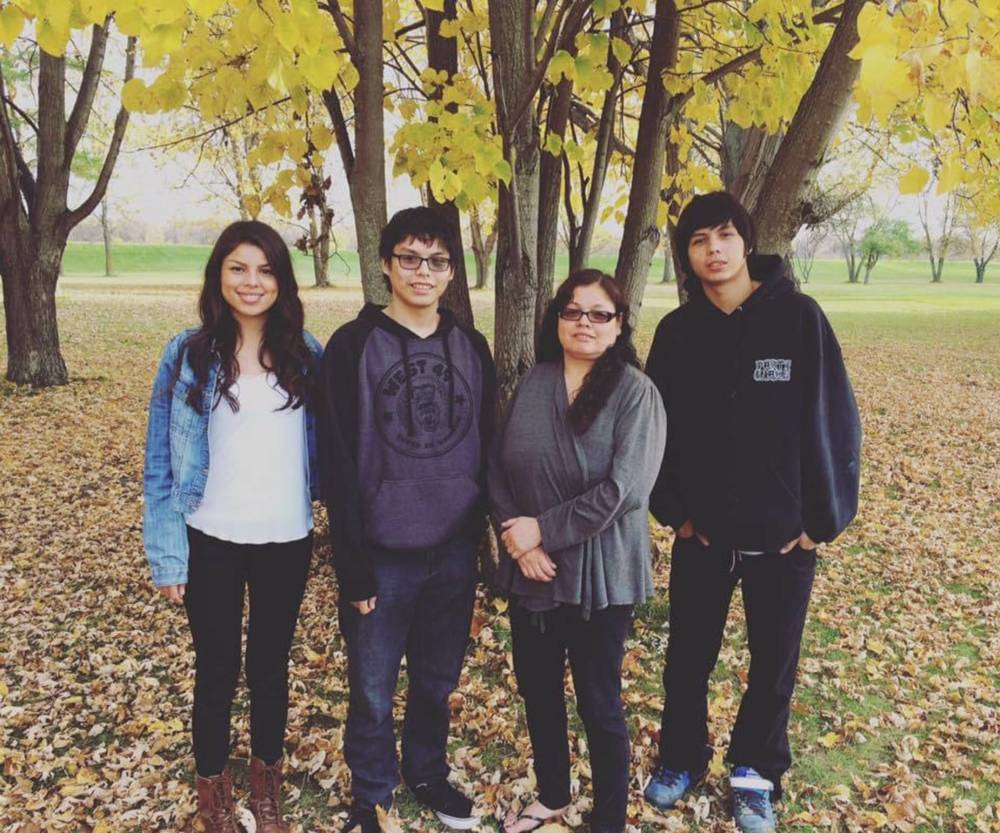‘He was a brother, son and friend’
Devastated family tried to get opioid user help before his death in August
Advertisement
Read this article for free:
or
Already have an account? Log in here »
To continue reading, please subscribe:
Monthly Digital Subscription
$0 for the first 4 weeks*
- Enjoy unlimited reading on winnipegfreepress.com
- Read the E-Edition, our digital replica newspaper
- Access News Break, our award-winning app
- Play interactive puzzles
*No charge for 4 weeks then price increases to the regular rate of $19.00 plus GST every four weeks. Offer available to new and qualified returning subscribers only. Cancel any time.
Monthly Digital Subscription
$4.75/week*
- Enjoy unlimited reading on winnipegfreepress.com
- Read the E-Edition, our digital replica newspaper
- Access News Break, our award-winning app
- Play interactive puzzles
*Billed as $19 plus GST every four weeks. Cancel any time.
To continue reading, please subscribe:
Add Free Press access to your Brandon Sun subscription for only an additional
$1 for the first 4 weeks*
*Your next subscription payment will increase by $1.00 and you will be charged $16.99 plus GST for four weeks. After four weeks, your payment will increase to $23.99 plus GST every four weeks.
Read unlimited articles for free today:
or
Already have an account? Log in here »
Hey there, time traveller!
This article was published 03/10/2022 (1162 days ago), so information in it may no longer be current.
The family of a man who died in hospital after being found in medical distress outside a fast-food restaurant in early August wants the world to know he was loved.
Cyril Joseph (CJ) Mowat was 33 when emergency responders found him unresponsive outside a Main Street McDonald’s restaurant between Mountain and College avenues early Aug. 5.
He died in hospital two days later, and although his family is awaiting the results of the provincial medical examiner’s toxicology report, they believe it was likely of complications related to an opiate overdose. He had been living transiently for about a year, and he — and they — struggled to get access to help without identification cards, income assistance or a fixed address.

ERIK PINDERA / WINNIPEG FREE PRESS
Laureen Mowat holds a sports jersey with No. 89 on the back. Her son, Cyril Joseph (CJ) Mowat, was born in 1989.
“He wanted to, he always talked about it, it’s just the barriers — not having a home, not having a phone, losing track of time — he missed an appointment (with Manitoba Employment and Income Assistance) by an hour and it took two weeks to get another one,” his younger sister Sarah Mowat, 31, said in a tearful interview at her McGregor Street home.
“I was trying to get him into treatment, he wanted to get help, but you can’t just walk into a treatment (centre) and say, ‘Hey, I need help.’”
Mowat’s story is not unlike others who’ve faced difficulties in accessing treatment, as the addictions and opioid crisis in Winnipeg and the rest of the country continues, with overall overdose deaths increasing yearly in Manitoba — from 200 in 2019 to 372 in 2020 and 407 in 2021.
“It’s nearly impossible for anybody who is living homeless or couch-surfing, for an individual who doesn’t have a support team wrapped around them, housed or not housed, it would be pretty much impossible to find a way into any kind of recovery program,” said Marion Willis, an advocate and founder of St. Boniface Street Links.
Winnipeg police were unable to identify Mowat after he died — he had no identification, personal effects, identifying marks or criminal record, with no fingerprints in law-enforcement databases — until they put out two public pleas to find his family in September.
Sarah Mowat was in Little Grand Rapids for work when she saw the Winnipeg Police Service Sept. 15 request for help on Facebook, with grainy surveillance photographs of her brother displayed.
“I knew that was him, even though they were just crappy pictures from the bus — I looked at it and I knew it was him, and I called my mom right away,” she said, sitting beside mother Laureen Mowat, 50, and younger brother John Mowat, 26.

ERIK PINDERA/WINNIPEG FREE PRESS
CJ’s mother Laureen and siblings John and Sarah Mowat embrace while speaking about their son and brother, who was found in medical distress outside of a fast food restaurant on Main Street early Aug. 5.
“I called that (police) number, and me and my mom had to wait to hear from the detectives to identify him.”
The three siblings grew up close with their extended family, living on Matheson Island on Lake Winnipeg, and in Selkirk, as members of Fisher River Cree Nation.
The family said he was a kind, humble and loving person, who taught himself to play guitar and was a dedicated, talented skateboarder.
Sarah had last seen him on July 26, shortly after his 33rd birthday, when she brought him some presents. He looked happy, she said.
His mother’s partner saw him around the same time, and he looked healthy, Sarah said. She last saw him walking down Main Street, where she gave him a big hug.
He had struggled with substance abuse, including opiates and, they believe, methamphetamine, which worsened after he was laid off from the City of Winnipeg’s recreation services department at the beginning of the COVID-19 pandemic, his family said.

SUPPLIED
A family photograph of the Mowats (from left): Sarah, John, mother Laureen and CJ.
Mowat and a girlfriend were kicked out of his last apartment, his sister said, and he had been living transiently since, occasionally staying with family, but often living rough.
“We want people to know that he did have family that loved him, he did have people that cared for him, but when you don’t have someone like that, in that lifestyle, you don’t understand,” Sarah said.
“He wasn’t just a homeless guy on the streets. He was a brother, son and friend.”
Sarah said she heard he had recently been trying to get off the drugs he was using. The family thinks he may have been struggling with painful opioid withdrawals and got some to ease his pain but used too much and overdosed. His girlfriend was also recently sent to jail, she said, leaving him alone in his lifestyle.
“A lot of (opioid) overdoses happen when you don’t use for a while and your tolerance isn’t as high — that’s the danger in it,” she said.
It was not unusual for Mowat to be in and out of contact with the family, Sarah said, but now she is racked with guilt.
“We didn’t know — we knew we didn’t have contact for a while, but usually we’d just go find him, or he’d come by, or call me,” she said.

ERIK PINDERA/WINNIPEG FREE PRESS
Laureen and siblings John and Sarah Mowat. They family said he was a kind, humble and loving person, who taught himself to play guitar and was a dedicated, talented skateboarder.
“We are really upset we didn’t try to find him sooner, or didn’t put in a missing persons report sooner.”
erik.pindera@freepress.mb.ca
Twitter: @erik_pindera

Erik Pindera reports for the city desk, with a particular focus on crime and justice.
Our newsroom depends on a growing audience of readers to power our journalism. If you are not a paid reader, please consider becoming a subscriber.
Our newsroom depends on its audience of readers to power our journalism. Thank you for your support.


